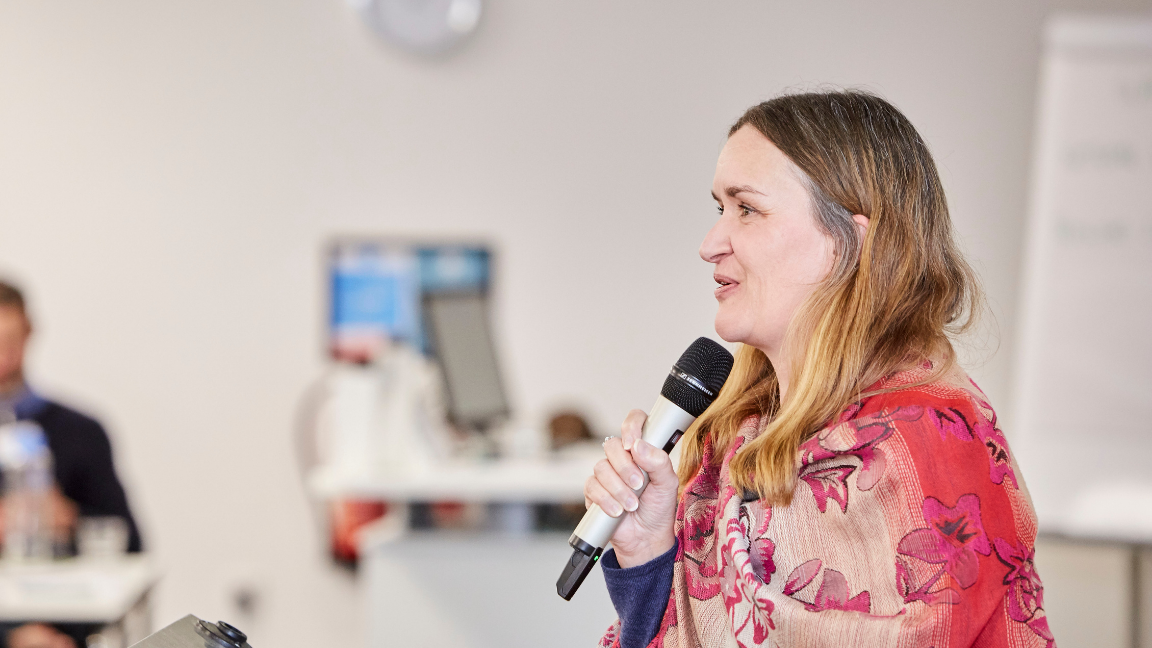Developing skills through knowledge exchange: Dr Sareen Galbraith
In this Q&A, Dr Sareen Galbraith, Senior Lecturer at Leeds Beckett University, discusses how our training and development opportunities have helped to progress both her technology and her career.
Project summary: The team – led by Dr Sareen Galbraith, in collaboration with research and development company, Axxonet System Technologies, and the Calderdale and Huddersfield Foundation NHS Trust – have developed a ‘Clasp’ glove, fitted with motion sensors which is designed to be worn for measuring and quantifying upper limb movement in Parkinson’s disease patients. Development of sensitive and reproducible personalised monitoring of patients will provide a wide variety of clinicians with regular objective measures of disease progression, reducing clinic costs and provide reassurance for patients and their care givers.
Collaborators: Dr Geetha Upadhyaya – Director, Mr Chetan Mukundan – Director, Axxonet Global Ltd, Mr Chetan Mukundan – Director, Mr Sumit Sharma – Chief Technology Officer, Axxonet System Technologies Pvt. Ltd, Dr Walied Mowafi – Consultant Neurologist, Calderdale and Huddersfield NHS Foundation Trust, Drs Dawn Knibbs and Philomena Commons – Senior Lecturers in Physiotherapy, School of Clinical and Applied Sciences, Prof Dorothy Monekosso – Director of Research, School of Computing, Creative Technologies and Engineering, Leeds Beckett University.
Q. How have you found working with co-development partners and what benefits has it brought to your technology? What skills have you learnt from partnering and how will these help you in future?
There is no way that it would have been possible to develop the “Clasp” glove without Axxonet because I would not have known what sensors to add to the glove. There is no way I would have developed the glove without my clinical partners because I needed to work with them to design upper limb movement tasks that were similar to the clinical assessment, which is UPDRS.
I have leant the value of spending time with other skilled professionals, such a medics and engineers is critical to the development of medical technology.
Q. Where was your career and project when Grow MedTech got involved?
I was a senior lecturer in microbiology and biomedical science. I lead the neurovirology and disease research group. I am developing medical technologies to support patients who are suffering from neurological disease and infections.
Q. How did Grow MedTech and Translate MedTech help?
I would not have been able to develop the “Clasp” glove without the two Translate secondments that I received. One secondment brought Dr Mowafi to the University to develop patient movement tasks and the other brought Axxonet engineers to the University to modify and further develop the “Clasp” glove prototype for clinical testing.
I was fortunate to receive summer student project funding at a critical time for “clasp” glove prototype testing, which really sped up the development of the medical technology.
I have also benefitted from extensive med tech training provided by Translate and Grow MedTech, which has really helped me to develop the “Clasp” glove. In addition, my Translate and Grow MedTech technology innovation managers have really helped and supported me as I developed the “Clasp” glove.
I have learnt a lot through Grow MedTech and Translate conferences and events. I have benefited from the opportunity to present my research and network with other people.
Q. How has your career developed during the project?
I have been able to develop and receive funding for medical technology research. This has helped my career progression.
I have learnt a lot about developing medical technologies for the NHS and other healthcare providers. I now understand a lot more about products, tools and services, marketing and delivering value.
Q. What is the most unique or interesting thing about this project?
Personal monitoring of a long term neurological condition.
Q. How did you first get involved in your specialist area? What sparked the idea?
I worked on a clinical trial in Nepal and saw first-hand the challenges faced by patients who suffer from neurological disease and infections.
Q. What inspires you?
Making a difference in the lives of others.
Q. What impact do you hope your work will have on the world?
I hope the glove will support patients with Parkinson’s disease and other neurological conditions. Those patients have a mixed disease progression, but they only see clinicians annually or biannually. This results in patients feeling that their medication is not working as well as it could. The “Clasp” glove will measure and quantify upper limb movement between clinical appointments.

